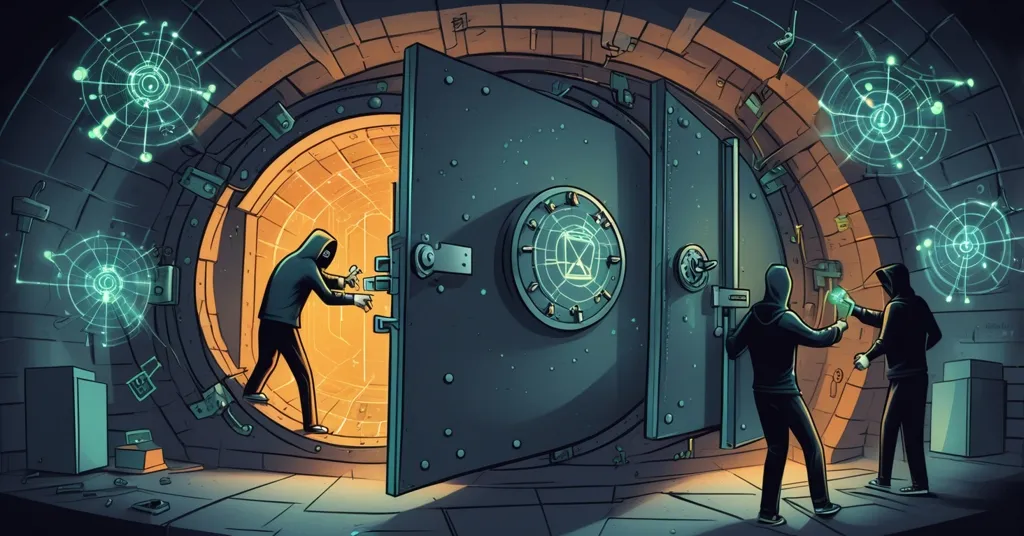Bybit Hack Exposes $1.5B Loss: Urgent Call for Crypto Decentralization

Crypto’s Centralized Trap: Lessons from Bybit Hack and the Need for Decentralization
The Bybit hack, resulting in losses of up to $1.5 billion, serves as a stark reminder of the vulnerabilities inherent in centralized exchanges (CEXs). Despite cryptocurrency’s promise to disrupt traditional finance and offer financial freedom, the industry remains entangled in systems prone to hacks and manipulation. Are we truly moving towards financial sovereignty, or are we just rebuilding the same vulnerable structures?
- Bybit hack losses up to $1.5 billion
- Centralized exchanges control liquidity and fees
- Call for shift to true decentralization and self-custody
The Bybit Hack: A Stark Reminder
The recent Bybit hack, attributed to the North Korean Lazarus Group, exploited vulnerabilities in the exchange’s transaction processes. Specifically, the hackers manipulated the transfer of funds between cold wallets, which are offline storage methods for cryptocurrencies, and hot wallets, which are online and more vulnerable to attacks. This incident not only resulted in significant financial losses but also led to a 20% drop in Bitcoin’s price from its all-time high, demonstrating the broader market effects of such breaches.
It’s like we’re playing a game of whack-a-mole with centralized exchange hacks. Just when you think you’ve got one under control, another pops up. The Bybit hack underscores the importance of cryptocurrency security in centralized exchanges, revealing that even supposedly secure methods like cold wallets are not immune to sophisticated attacks.
The Fragility of Centralized Exchanges
The collapse of Mt. Gox in 2014, where 850,000 Bitcoin vanished, was supposed to be crypto’s ‘never again’ moment. Yet, here we are, with the Bybit hack echoing similar vulnerabilities. Centralized exchanges, which were meant to break free from traditional financial institutions, now control liquidity, set fees, and act as market makers—entities that influence market prices. This leaves users trapped in a system that’s as prone to hacks and manipulation as any bank.
“Crypto was meant to free users from traditional financial institutions. Instead, most users are still trapped, reliant on centralized exchanges that control their funds.”
Despite the ethos of decentralization, most trading activity in the crypto space still occurs on these centralized platforms. They lack the safeguards found in traditional finance, making them ripe targets for cybercriminals like the Lazarus Group, known for state-sponsored hacking. The growing threat of such attacks underscores the urgency of improving security measures across the board.
The Path to Decentralization
The next phase of crypto needs true ownership without barriers or intermediaries. Ramon Recuero’s call for a shift towards truly decentralized infrastructure resonates with the original promise of cryptocurrency. This shift involves adopting self-custody solutions, where users control their private keys, and promoting cross-chain liquidity—the ability to move assets freely between different blockchains—to create user-controlled markets.
Decentralized exchanges (DEXs) and smart contracts are potential solutions that could drive this shift. DEXs operate without a central authority, using smart contracts to facilitate peer-to-peer trading. This reduces the risk of hacks and manipulation, aligning more closely with the principles of decentralization and financial sovereignty.
“The next phase of crypto needs true ownership without barriers or intermediaries.”
Despite these challenges, the future of crypto lies in embracing true decentralization. It’s not just about avoiding the next hack but about realizing the potential for financial freedom that drew many to crypto in the first place.
Regulatory and Security Implications
The Bybit hack has sparked discussions on cryptocurrency regulation, with the Trump administration aiming to position the U.S. as a “crypto capital.” While regulatory changes could address some security concerns, they might only patch up the same old problems without a shift towards decentralization.
Users also have a role to play in maintaining the security of their DeFi wallets. Safeguarding seed phrases and being vigilant against phishing scams are crucial steps in reducing the risks associated with decentralized systems. The responsibility lies not just with the platforms but with the community as a whole to drive this change.
Real-World Successes
Successful DeFi projects like Babylon.finance, which achieved over $50 million in assets under management, illustrate the feasibility and benefits of moving towards decentralized systems. These examples demonstrate that it’s possible to realize the promise of financial freedom through true ownership and user-controlled markets.
Key Questions and Takeaways
- What lessons should the crypto industry learn from past failures like Mt. Gox and Bybit?
The industry must move away from centralized systems, which are prone to hacks and manipulation, and embrace true decentralization to prevent future vulnerabilities.
- Why do users continue to rely on centralized exchanges despite the risks?
Centralized exchanges offer liquidity and ease of use, but at the cost of user control and security. Users are often trapped by the convenience these platforms provide.
- How can the industry shift towards more decentralized infrastructure?
By focusing on self-custody solutions, cross-chain liquidity, and user-controlled markets, the industry can move away from centralized exchanges and towards a more secure and sovereign future.
- What role does true ownership play in the future of crypto?
True ownership is essential for realizing the promise of financial freedom in crypto, allowing users to control their assets without intermediaries and fostering a more decentralized ecosystem.
- What are the implications of centralized exchanges controlling liquidity and setting fees?
Such control leads to market manipulation and a lack of financial sovereignty for users, undermining the core principles of cryptocurrency and highlighting the need for a decentralized alternative.
Conclusion
The Bybit hack should be a wake-up call for the crypto industry. As Ramon Recuero warns, “The Bybit hack should be a wake-up call. But will it?” The path forward is clear: embrace the principles of decentralization that drew many to crypto in the first place, or risk remaining trapped in a cycle of vulnerability and centralized control. The future of cryptocurrency hinges on our commitment to decentralization. Where do we go from here?



